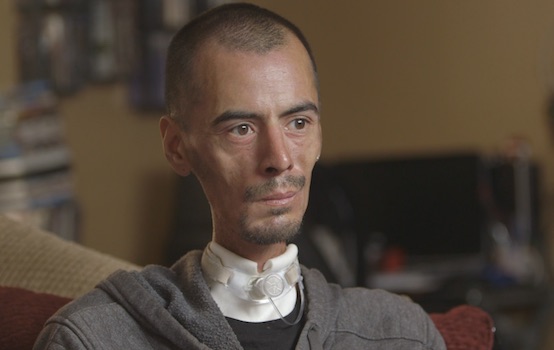One look at Brian Alvarado and you wonder how he can still be alive. Especially when you get a glimpse at his pre-deployment photograph—a soldier in Marine service uniform, full-faced and ready for whatever war would dish out—and think, “is this really the same person?”
Unfortunately, yes, Alvarado served two tours 10 years ago, and for a time he patrolled “hell,” which is what the guys called the open air burn pits on major U.S. military installations like Air Base Balad in Iraq. When he got home, according to his wife, he was diagnosed with Squamous Cell Carcinoma (throat cancer) and began chemo and radiation in 2008. Today he can hardly speak and eats and drinks through a G-tube. His features are skeletal, his neck the size of man’s wrist. He is 5-foot-9 and weighs about 70 pounds.
For Alvarado and his wife Rocio, coming to terms with the cancer was one thing, but how he may have gotten it—from the burn pit itself— is another. He is one of thousands of U.S. military servicemembers and contractors who say their proximity to the pits in Iraq and Afghanistan, which burned—unregulated, in the open air—hundreds of tons of solid waste a day, have left them with progressive health conditions, including respiratory failure, debilitating nerve damage, and rare forms of cancer.
“There was no protection, no mask,” Alvadrado said through his wife, who interprets his indiscernible speech, or reads from the mini-white board he carries with him to communicate. “They gave us a gas mask, but it wasn’t for that. It was more for nuclear, biological chemicals. It was never mandatory for us to wear that.”
The veterans’ journey—from healthy soldiers to barely surviving, like Alvarado—has been captured in a new independent documentary, Delay, Deny, Hope You Die: How America Poisoned its Soldiers (the first part of that is a black slogan among vets, referring to the protracted dance with the VA over health claims), by director and producer Greg Lovett.
Read more at The American Conservative.
































